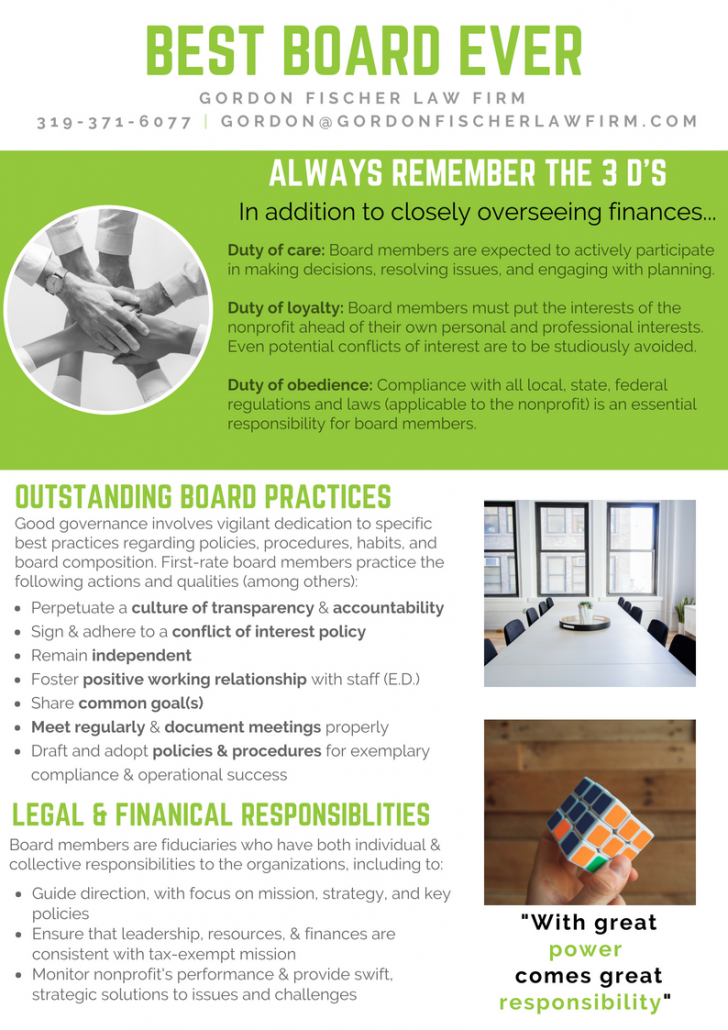Any good attorney worth their weight will advise you on multiple aspects of any given important action or decision. Let’s say you’re considering forming a new 501(c)(3). You may have thoroughly considered all the prospective benefits of a tax-exempt entity, but what about the responsibilities? Indeed, there are serious obligations that come along with creating and running a nonprofit. These can’t be overstated and should certainly be taken into account. Let’s dive into a few of them.
Monetary cost
Establishing a nonprofit organization does require a monetary cost including the filing fees to governmental agencies, such as the Iowa Secretary of State’s Office and the IRS. (The Iowa Secretary of State has a $20 filing fee, and the IRS 1023 Form has a current user filing fee of $600.) If you elect to hire a qualified nonprofit attorney to guide you through the formation process and draft the required forms, then that will be an additional cost. (Although I would always argue a worthwhile one!)
Once the nonprofit is formed you’ll also want to invest in keeping your nonprofit organization on track, compliant, and successful. A major part of this is drafting and implementing quality internal and external policies and procedures. Again, a nonprofit lawyer can be a valuable asset and provide expertise here.
Cost of time & effort
On top of the monetary costs, there are additional costs of time and effort. It typically takes a few months to pull all the paperwork together for the formational documents—especially the lengthy Form 1023. After all the paperwork is submitted for IRS review, actual 501(c)(3) approval can vary in the time it takes. A submitted Form 1023 can take anywhere from a month or two to a year to make its way through the review process; the 1023EZ‘s turnaround time depends on the backlog of review at the time.
Even after all of the required documentation is submitted for recognition of exemption, the IRS may request additional information through follow-up questions and supporting materials. And, of course, actually operating the nonprofit will take significant, continuous time and effort which can range in extent, but can include new employee hires, nonprofit board orientations and training, and compliance with state and federal laws (like Sarbanes-Oxley, for instance).
The flip side of this is that nonprofit work is often incredibly rewarding and important, making the effort and time even more worthwhile. But, again, it’s something good to just keep in mind as you weigh all inputs to your nonprofit formation decision.
Paperwork
A nonprofit is required to keep detailed records and also submit annual filings to the state and IRS by particular deadlines to keep its active and exempt status. (Reminder: having well-written policies and procedures will make the annual filings, like Form 990, an easier process!)
Shared control
As an incorporator of a nonprofit, you will certainly have a say in the development of the organization. Although one who creates nonprofits may want to shape his/her creation, personal control is limited. A nonprofit organization is subject to laws and regulations, including its own foundational documents such as articles of incorporation and bylaws. An Iowa nonprofit is required to have a board of directors, who have certain legal and financial fiduciary duties to uphold. The board itself also has collective responsibilities, so no one person is held solely accountable. Board orientation, trainings, and materials—like a board handbook—organized in a specific way can go a long way toward ensuring the board is set-up for success in working toward the mission you as the founder envisioned.

Scrutiny by the public
In the eyes of the government and society alike, the nonprofit must be dedicated to the public interest in one area or another. This is where it derives its tax-exempt status. It’s also why its finances are open to public inspection. For these reasons, nonprofits must be steadfastly transparent in nearly all their actions and dealings.
Interested parties may obtain copies of a nonprofit organization’s state and federal annual information filings to learn about salaries, program expenditures, and other financial information. You should be able to view copies of exempt organizations’ forms for free on the IRS’ website, or you can request a copy from the organization and they must provide it. Additionally, to make it easy for the public, many nonprofits link to these documents on their website. The information can be useful to current and prospective donors, new board members and employees, and grant-making organizations.
I hate to sound like a broken record, but again, this is where superior policies like “public disclosure” and “Form 990 review” are paramount to the operation.
These responsibilities shouldn’t scare you off from forming your change-making organization, but rather important elements to be aware of from the beginning. Plus, if you know the big picture of what you’re getting into, you can plan by enlisting the appropriate professionals to help you with your endeavor!
Want to discuss how to move forward with your nonprofit? Don’t hesitate to take me up on my offer for a free consult and the 10 For 990 policy special! Contact me via email or by phone (515-371-6077).



